Bogotá DC / Cundinamarca / March 6, 2008

The March 6th march as it passed through Seventh Avenue.
POLITICAL DECLARATION OF THE NATIONAL MOVEMENT OF VICTIMS OF STATE CRIMES (MOVICE) IN THE FRAMEWORK OF ITS FOURTH MEETING
The IV Meeting of the National Movement of Victims of State Crimes is convening after the great march of victims and the population that has expressed solidarity with our cause throughout the country and around the world (at least 100 events have been held worldwide; marches, rallies, and events have been held in approximately 20 departments across the country, with thousands of people participating, including victims, their organizations, and supporters). This large-scale mobilization took place in an environment of harassment, stigmatization, and threats from the government and paramilitaries. We can affirm that the recognition of our movement is a reality, and that our proposal for historical truth, justice, comprehensive reparation, and guarantees of non-repetition has been consolidated.

The traditional slogan “no forgetting” and a criticism of the president.
- The 4th meeting reaffirms that the Movement, in its proposal to combat impunity, will continue to promote its eight strategies for Colombian society. We believe the strategies approved at our previous meeting are a success. The population increasingly accepts our demands as valid. When our slogans of “no forgiveness and forgetting” are chanted or raised, we cry out to rescue the memory and dignity of the victims; our demands for justice so that crimes do not continue in impunity; the demand for the return of all stolen property, guaranteed return or relocation; international support in the Ethics Commission for the Truth; public hearings for the truth; the location of mass graves and the process of identifying victims have been precarious but have demonstrated that it is possible to recover our loved ones, bury them, and grieve as appropriate according to our beliefs; progress has been made in the need to document the genocide that indigenous communities, social sectors, and opposition political parties have suffered over the past decades. Our call is for us to continue to deepen the eight strategies, for every victim, every organization, and ultimately every Colombian to embrace them, defend them, and make them a reality.
- The Movement has been growing stronger; many regional chapters have been formed despite the difficult context faced by victims and their organizations; we must continue promoting the formation of new regional chapters. It is also essential to have support to help strengthen these chapters, as well as psychosocial strategies for managing the damage caused by crimes, etc. But it is also necessary to continue expanding the Movement, reaching other important sectors such as those tortured, illegal detainees, exiles and refugees abroad, and the population affected by fumigations and bombings.
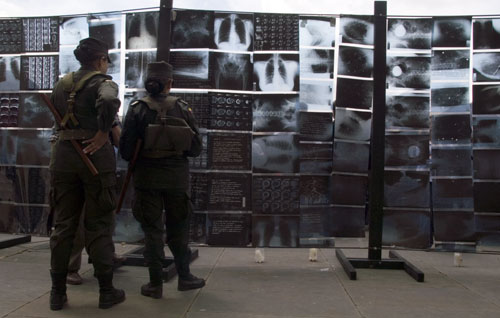
Female police officers observe an installation dedicated to the victims in Plaza de Bolivar.
- We reaffirm that, following the National Government’s dialogue and negotiation process with the paramilitary movement, it remains in place and is growing stronger. Criminal groups that did not demobilize or reintegrate continue to operate in the same areas, and all areas are fully militarized by the army and police. The reality of the demobilization is that only 55 of these criminals are in prison; in other words, we are witnessing the largest impunity operation in recent times. Alternative mechanisms to Law 975 have allowed politicians linked to paramilitaries to be brought to trial. We recognize the role played by the Criminal Chamber of the Court and the Prosecutor’s Office in advancing some cases and bringing them to trial.
- We have observed in the regions the complete lack of protection for victims, their families, and organizations; Therefore, we believe there is a need to seek international support and increasingly demand the guarantees recognized by human rights treaties and conventions, so that the State guarantees our rights to organization, mobilization, and, above all, to continue defending our rights, whether within this framework of the legalization of paramilitarism or in future spaces of negotiation with guerrilla movements.

Iván Cepeda, one of the leaders of MOVICE, during his speech at the end of the march.
- We reaffirm the existence of a social, political, and armed conflict in Colombia, which we have endured for nearly 40 years, and which must be resolved at its structural causes. Throughout this period of military intervention by the United States and other industrialized countries, we have seen a privileged use of military aid for Plan Colombia I and II, or for the fight against terrorism or drugs, etc. This aid has not contributed to solving the problem; on the contrary, there is more war, more polarization, more deaths, and more harm to the population. We ask ourselves: who benefits from all this tragedy? The answer can only be the same as always: the major war industrialists, the military, and national and international economic groups. Therefore, we will continue to raise the need for a negotiated political solution to the conflict, the implementation of humanitarian agreements, the exchange of prisoners, etc. 7. We defend national sovereignty, the self-determination of the peoples of Colombia and Latin America, and the struggle for peace on the continent. We demand the cessation of military bases and the presence of foreign bases.
8. The National Movement of Victims of State Crimes reaffirms its decision not to participate in the so-called National Action Plan on Human Rights agreed upon with the State and proposes that civil society develop an alternative plan.
9.We recognize in these efforts the work carried out by Senator Piedad Córdoba and the mediation of President Chávez, which led to concrete results in the release of seven prisoners. We also recognize the role of the countries of the Rio de Janeiro Group summit and of the friendly countries for peace in Colombia and the continent: France, Spain, Switzerland, Cuba, etc. It is concerning that the search for humanitarian alternatives for the release of these prisoners is in the hands of other governments and that the Colombian government is not taking up this great national outcry. We call on all of them, and on the entire international community of states and organizations such as the UN and the OAS, to fulfill their true role in preserving world peace and to propose initiatives in this regard, with the aim of resolving, with their help, the conflict we have endured for over 40 years. We reaffirm to all of them that our rights to historical truth, the application of justice, full reparation for all the harm caused, and guarantees of non-repetition are non-negotiable. Therefore, we demand our right to participate in the resolution of the conflict with our delegates and proposals, and to decide in plenary session on any agreement reached. We do not want to leave our future and that of our loved ones in the hands of those who perpetrate and benefit from these crimes.
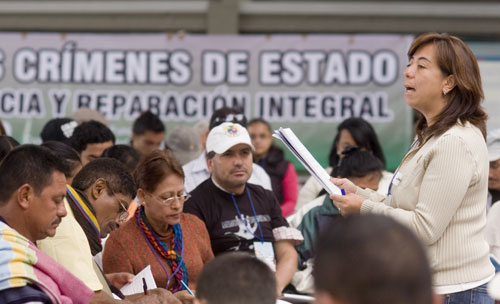
Various working groups were held during the 4th Assembly of Victims of State Crimes.
Faced with this harsh reality, our movement allows itself to suggest the following:
PROPOSALS:
- From the Ethics Commission, work toward a true historical Truth Commission, or the prosecution of Crimes Against Humanity, when democratic guarantees exist in Colombia. In this commission, we can participate as victims and discuss all elements of the commission, such as budget, personnel, infrastructure, venues, duration, timeframe for investigation and prosecution, crimes committed, etc.
- Propose true justice, which implies establishing true equality before the law, abolishing political, religious, military privileges, and any other privileges or immunities; establishing a true judicial career, popular election of judges, prosecutors, and magistrates; an autonomous budget, juries based on popular conscience, equal prison terms for all prisoners without distinction, equal trials under equal conditions for all cases, a single leadership in the judicial branch, and its full autonomy.
- Stop the war by declaring a bilateral truce and initiating a dialogue process in the country, involving the entire Colombian society, including the issue of human rights and international humanitarian law violations. Facilitated and mediated by governments and international organizations such as the UN and OAS.
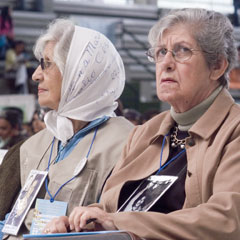
Mirta Miravalle and Fabiola Lalinde, mothers of victims of state violence from Argentina and Colombia.
- The abolition of paramilitarism, its effective dismantling, and the demand to cease all foreign military aid. We do not want cooperation for war and for them to then seize our natural resources and take over our territory.
- We request the support of all international organizations to ensure the lives of the victims and their organizations are protected in this process, and to ensure that the few trials that have been initiated against paramilitaries and politicians linked to these criminal structures are concluded as quickly as possible.
- We call on all victims to strengthen their organizations and to work together at a single table before the State and the so-called international community of States and organizations so that our rights are respected and guaranteed and so that we are recognized as interlocutors on the issue of human rights.
- We propose the need to hold a National Conference on Lands and Territories and also a National Meeting on Democracy and Genocide; both events will be preceded by regional workshops. Bogotá,
March 8, 2008
(Before and after the march, threats and murders were made against some of its organizers. We reproduce the complaint below.)
COMMUNICATION
Presidential advisor José OBDulio Gavíria is held responsible.
THREATS, HARASSMENTS AND MURDERS OF SOCIAL ORGANIZATIONS, HUMAN RIGHTS DEFENDERS, TRADE UNIONISTS, AMONG OTHERS, ARE INCREASING AFTER THE MARCH 6 MOBILIZATION
Social Organizations – March 14, 2008
Within the framework of the current government’s “Democratic Security” policy, the climate of militarization has worsened, and attacks against the civilian population and social and human rights organizations have worsened. Contrary to what is presented in government reports, this policy has not led to an improvement in the human rights situation. On the contrary, extrajudicial executions committed directly by security forces, arbitrary arrests, and judicial setups have increased, and the landscape of sociopolitical violence has changed due to changes in the aggressors’ behavior.
It is false that paramilitaries have demobilized. Reports from various bodies, such as the OAS, indicate that “armed gangs” continue to operate throughout the country, under various names (Águilas Negras, Organización Nueva Generación, etc.), continuing to attack social organizations. This proves that the process undertaken between the government and paramilitary groups has not led to the dismantling of paramilitaries.
Attacks against organizations and their leaders are intensifying precisely at a time when social protest and struggle are most visible, and when the situation and rights of victims are gaining ground in national and international debate. From the moment the day’s proposal was made public (February 5), the stigmatization and accusations, primarily from the high government and other far-right sectors, have generated a climate of polarization whose consequences have been swift.
As part of the call for the “Tribute to the Victims, the Displaced, the Murdered, the Disappeared. Memory and Dignity” event on March 6, which also coincided with the Fourth Meeting of the National Movement of Victims of State Crimes, more than 24 mobilizations were held nationwide and 70 internationally. Undoubtedly, the public response to the event exceeded the expectations of the organizing organizations.
Below we recount the serious incidents that have occurred in recent weeks against individuals and organizations that led or supported the call and whose work is part of the defense of human rights in Colombia.
FACTS
Since February 10, presidential advisor José Obdulio Gaviria has reported through various media outlets that the March 6 march would be convened by the FARC.
In similar statements, the presidential advisor directly attacked Iván Cepeda, a human rights defender and member of the Promotion Committee of the National Movement of Victims of State Crimes (MOVICE).
On February 11, 2008, an editorial on the website of “Colombia Libre,” the official site of the paramilitary group United Self-Defense Forces of Colombia (AUC), stated that the March 6 mobilization was a march “between revenge and opportunism,” organized by FARC sympathizers.
On February 12, threatening pamphlets against the march organizers were distributed by email. The threats were signed by the paramilitary group “NGO Nueva Generación Nariño.”
On February 17, Mauricio Cubides, a member of Fensuagro (a member organization of MOVICE), received death threats and was the victim of an attempted kidnapping. As a result of the threats he received, he had to leave the region.
While preparing for the Tribute, Iván Cepeda received several email threats accusing him of being an “ally of the FARC guerrillas.”
On February 29, shots were fired at the apartment of Luz Adriana González, secretary general of the Permanent Committee for the Defense of Human Rights (CPDH) in Risaralda. This organization is part of MOVICE, and Luz Adriana was promoting the tribute. This same week, threatening letters were circulated against Guillermo Castaño, president of the CPDH, leader of the National Agricultural Federation, and the Peasant Corporation for Sustainable Development.
On March 4, Leonidas Gómez, a Citibank employee, member of the National Company Committee of the National Union of Bank Employees (UNEB), the National Education Team of the Single Central Workers’ Union (CUT), and a member of the district leadership of the Alternative Democratic Pole political party, was disappeared and later found murdered in his apartment.
On March 6, the day of the Tribute, Antonio Pedrozo, a member of the Tejiendo Esperanza organization and coordinator of the National March of Displaced Persons, received death threats in an anonymous envelope containing a ballot with the legend “FARC leader, death now” and the cover reading “social action for Libardo Pedrozo.”
During the Tribute to the Victims, serious incidents occurred in several cities. In Cúcuta, there was harassment, and civilians not involved in the march took photos and videos. In Bogotá, a young man was identified following and harassing Iván Cepeda during his march along Seventh Avenue.
On March 7, Rafael Boada, President of UNEB Bucaramanga Branch, was the victim of an attack, but fortunately escaped unharmed. Rafael had received several death threats.
On the night of March 7, Gildardo Antonio Gómez Alzate, an educator and delegate of the Association of Teachers of Antioquia (ADIDA) and a member of the Center for Teaching Studies and Research (CEID), was murdered.
That same day, computers were stolen from the offices of ASPODEGUA, FENACOA, and the CND, containing files containing important information for their work.
On Sunday, March 9, Carlos Burbano, a member of the ANTHOC Sub-Directorate and promoter and organizer of the March 6 mobilization, was murdered.
On March 11, several social and human rights organizations received a death threat via email from the paramilitary group “Águilas Negras.” It included a list of individuals and organizations, including Minga, Fundip, Asopron, Andas, Asdego, Asomujer, Fenacoa, Codhes, CUT, ONIC, the Colombian Commission of Jurists, Ruta Pacífica de las Mujeres (Women’s Pacific Route), the Permanent Assembly of Civil Society for Peace, Asomujer, and Trabajo; Reiniciar, an organization that has filed an international lawsuit against the Colombian state for the genocide of the Patriotic Union and has received repeated threats and attacks; Luz Helena Ramírez, a member of the MOVICE Promotion Committee; and other organizers and participants in the march.
These events only demonstrate that paramilitarism in Colombia continues to exist, and that the demobilization process carried out by the national government has only resulted in a restructuring of its structures. Their presence, rather than disappearing, is increasingly evident throughout the country, particularly in places where there is strong social organization. These threats demonstrate a lack of genuine will to seek peace.
It is especially worrying that the highest government has launched a campaign of accusations against the organizations and leaders of the March 6th protests, an attack that adds to the already long list of attempts to delegitimize the defense of human rights in Colombia.
It is clear that the national government, led by President Álvaro Uribe Vélez, which promoted the February 4th mobilization with all the means at its disposal, failed to do what was necessary for the March 6th protests and, on the contrary, attempted to cast a shadow of doubt on the victims of state crimes and paramilitarism in Colombia from demanding their rights.
We hold presidential advisor José Obdulio Gaviria responsible for the events that occurred, as well as for the safety of the threatened organizations, first and foremost for his reckless and irresponsible statements. We demand that the high-ranking government rectify the information disseminated about the March 6 protests and those who organized them, and that society’s right to peaceful public demonstration and to exercise political opposition be recognized.
We call for national and international solidarity to investigate the origins of the threats and determine those responsible for the murders and attacks against social leaders.
Likewise, we demand that the Colombian government achieve immediate results in the real dismantling of paramilitarism, as well as the State’s purging of the lists compiled by military intelligence agencies, which have contributed to the stigmatization and systematic elimination of those who are part of the social and human rights movements.
Likewise, we demand that the Colombian government achieve immediate results in the real dismantling of paramilitarism, as well as the State’s purging of the lists compiled by military intelligence agencies, which have contributed to the stigmatization and systematic elimination of those who are part of the social and human rights movement.
Movement of Victims of State Crimes, Reiniciar, Minga, Permanent Assembly of Civil Society for Peace, Committee in Solidarity with Political Prisoners, Permanent Committee for the Defense of Human Rights, ANDAS, ONIC, CUT Bogotá-Cundinamarca Sub-Directorate, CUT Human Rights Department, National Union of Bank Employees (UNEB), ADMUCIC, Ruta Pacifica de Mujeres, Sons and Daughters for Memory and Against Impunity, José Alvear Restrepo Lawyers Collective (CAJAR), Colombian Commission of Jurists (CCJ), and others.




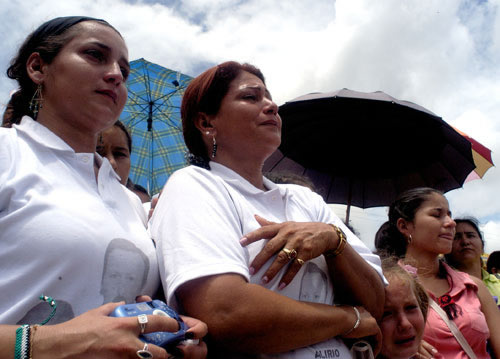
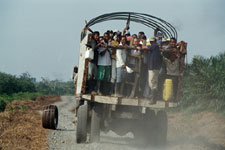
Leave a Reply